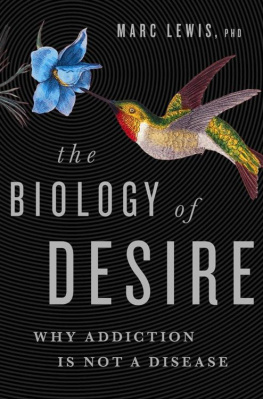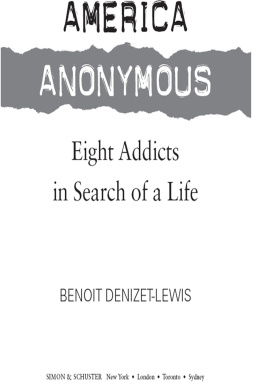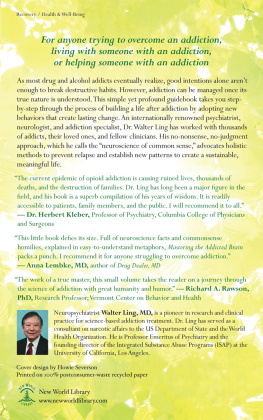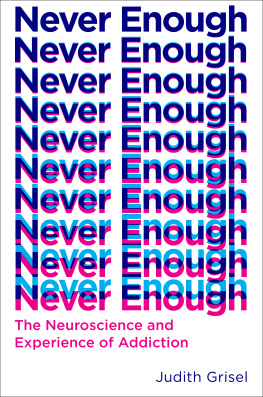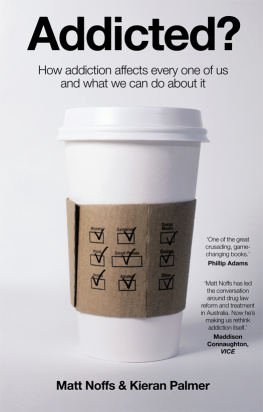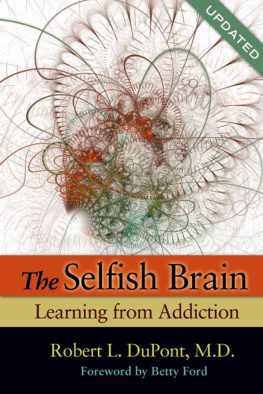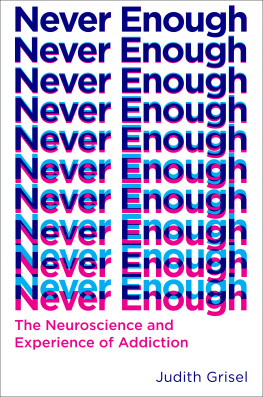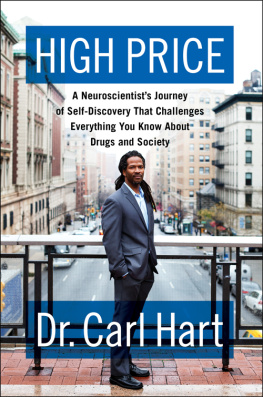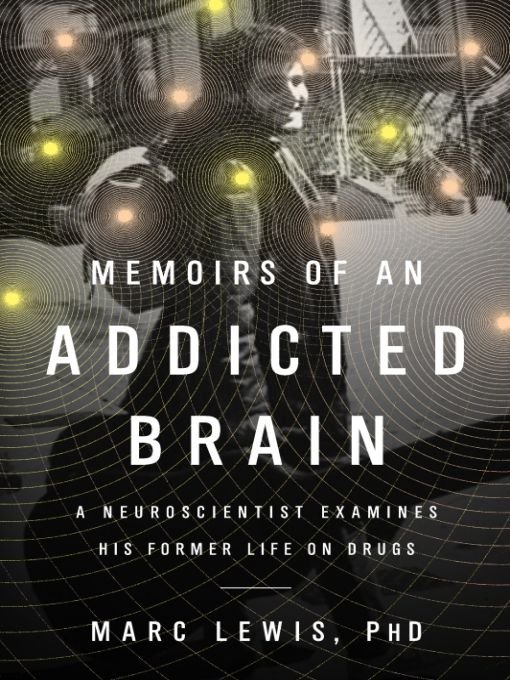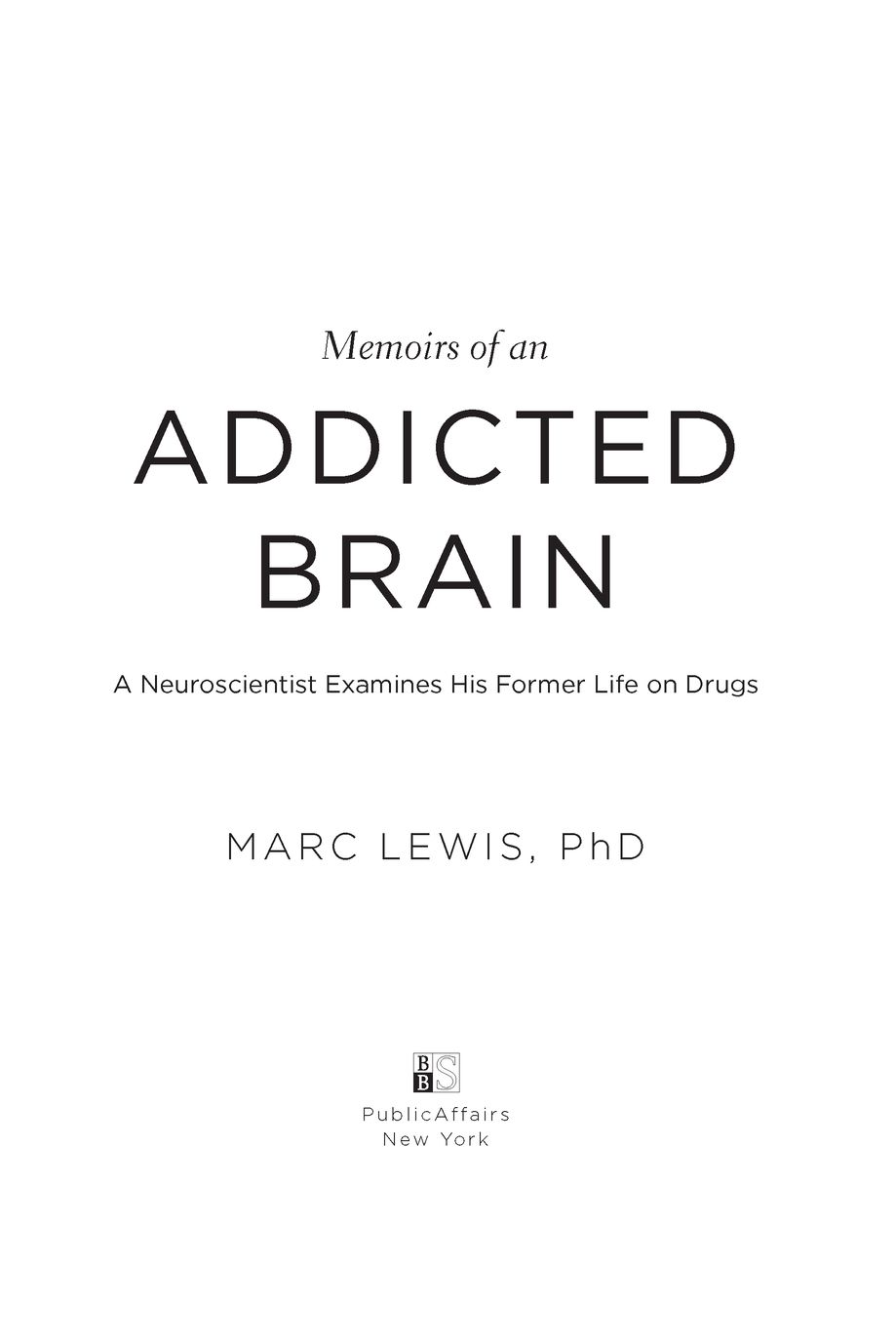Table of Contents
For Isabel,
who never lost confidence in this book or its author
INTRODUCTION
WE ARE PRONE TO A CYCLE of craving what we dont have, finding it, using it up or losing it, then craving it all the more. This cycle is at the root of all addictionsaddictions to drugs, sex, love, cigarettes, soap operas, wealth, and wisdom itself. But why should this be so? Why are we desperate for what we dont have, or cant have, often at great cost to what we do have, thereby risking our peace and contentment, our safety, and even our lives? Why are we so moved by our addictions, either succumbing to them or spending our energy fighting them? This book shows how the fundamental workings of the brain are at the root of the problem, but from a unique vantage point. I use the events of my own life as a springboard to the addicted brain. In fact Im an expert on the matter, from inside out and outside in, because Im a drug addict turned neuroscientist.
In some ways, drugs are just another addiction. More powerful than many, more harmful than most, but just another pot of gold at the end of the rainbow. Yet drugs are also unlike any other addiction, more revealing than any other addiction, because they ignite the neural flush of well-being directly, without the requirement of any particular experience or event. Drugs trick the brain into dispensing the neurochemicals of reward, or they mimic those chemicals themselves. Drugs provide a shortcut. They talk to the brain in its own languagethe language of dopamine and peptides, neuromodulators and receptors. So drugs can teach us a lot about the brain, and what we know about the brain can teach us a lot about addiction. Neuroscientific research on addiction has progressed enormously in the last twenty years. But it doesnt go all the way. It lays out the pieces of the puzzle but doesnt connect them, because it ignores the actual experiences that turn real people, motivated by hope as much as hedonism, resolve as much as indulgence, back into addicts, again and again.
This book brings the brain and human experience together, by telling the story of my descent into drug addiction, interspersed with lessons on the brain and its workings drawn from contemporary neuroscience. I follow the thread of adventures that began in a New England boarding school, when I was fifteen years old and despondent, a thousand kilometres from my home in Toronto. From there I moved to Berkeley, California, in the heyday of the drug movement, and upgraded my flirtations with cough medicine to an infatuation with LSD and then heroin. Interspersed with university life in Berkeley, I spent two years in Asia, where I joined medics sniffing nitrous oxide in the Malay jungle, bought heroin direct from the factory in Laos, and became a regular in the opium dens of Calcutta. I moved back to Toronto, married a woman I couldnt talk to, began stealing drugs from the psychology lab, then from medical centres, got clean, got divorced, fell off the wagon again, and ended up working in a mental hospital where the howls of the crazy people drove me back to crime. I finally got arrested and convicted, and then came the tortuous road to a lasting recovery. At the age of thirty, I traded in my pharmaceutical supplies for the life of a graduate student, eventually becoming a professor of developmental psychology, and then of neurosciencemy field for the last twelve years. Now I study the brains of children who get into trouble, using the electrical signals from their scalps to explore whats going on underneath. But I often recall that I used to be one of those kidsthat, no matter how many scientific conferences I attend, I will always be one of those kids.
Each chapter introduces a new drug experience, or a new stage of drug addiction, as the central theme of an episode from my own life and, sometimes, the lives of lovers, seekers, and sinners I met along the way. And each of these experiences is shown to emerge from a particular brain system, neurochemical flow, or synaptic process. Through the interplay of lived experience and neural activity, the addicted brain is revealed, and addiction is shown to be a basic vulnerability of the nervous system itself.
The episodes recounted here are all factual, to the best of my ability to remember them, though some are blended to maintain the pace, and names and locations are sometimes disguised. I could not invent a story as strange and frightening as the life I lived as an addict. The dialogue is a best approximation of actual conversations, with some snippets burned in my memory and others deduced from more general recollections. Over twenty volumes of journal entries helped me recall what life was like in my teens and twenties. Finally, the neuroscience in these pages, though simplified and accessible to the nonexpert, is up to date and accurate. Many brain books pass on findings from twenty years ago, or blur the details to make them more digestible. Here the details are precise and the data as current as last years journal articles. The brain is incredibly complex, but it is not beyond understanding.
PART ONE
THE TABORCHRONICLES
CHANGING STATE
The first time I got drunk was with Damien Tennant. It was a March night and freezing cold. I had been at Tabor less than six months, and depression was now a palpable daily companion, a disease to be managed. There were good days and bad days, but the good days were just tolerable and the bad days nearly did me in. I hated this school. It was bigger than me, it was stronger than me, and it seemed as natural a part of the New England landscape as the rocky coves and stands of maple. I didnt belong here. I had got here by mistake. My first two years of high school had been at a nice, normal suburban Toronto school a few blocks from my home. I might not have been the most popular kid in class, but nobody seemed to actively dislike me. I had a few friends. I got invited to a few parties. I had a girlfriend for a couple of months. And I could go home at night. That was the main thing. Here at Tabor, there was no home to return to at the end of the dayexcept the dorm. And I hated the dorm. I hated every whitewashed board, every hissing radiator, every creak in the polished hardwood floors. I hated my room, I hated my roommate. I hated the guy next door. And I hated my proctors, the senior boys whose job it was to supervise us and care for us while helping induct us into this bizarre paramilitary culture.
Para-naval, actually. Tabor was a para-naval academy, but that didnt mean much to me at the time. The naval terminology seemed a bad joke, an effort to reenact the Hollywood heroism of World War II. We would sometimes see men who looked like admirals strolling the pathways with the headmaster. Gold stripes on dark blue cuffs. There were special prayers at vespers, navy uniforms to be ironed and worn a few weeks a year, drill sessions with guns and a marching band. And yes, we were located on a body of water and there were a lot of boats: sailboats, rowboats, crew boats, a schooner out in the harbour. It was the boats that had attracted me in the first place, the previous spring in Toronto.
Marc, wed like to talk to you about your options for next year, my mother had said in her frank, slightly invasive tone.
What options? I was beckoned to the kitchen table, where I sat down with both parents. The table was covered with pamphlets from different private schools, most of them in New England.


